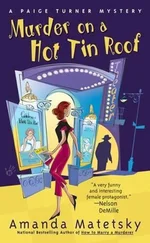Just the thought of Guidry investigating Laura’s murder sent a chill into my bones, because it was a reminder of Guidry’s job. Every day, he dealt with murder—the grisliest, ugliest, most sordid side of humanity.
Being involved with any law enforcement officer means being vicariously close to violence, at least to some degree, but being involved with a homicide detective means being close to the ultimate effects of brutal hatred. I wasn’t sure I was strong enough for that. I wasn’t sure I wanted to be strong enough for that. I wasn’t sure I could spend my nights in bed with a man who spent his days investigating murders.
Not that I’d been invited to spend any nights with Guidry. Not that he had ever even hinted that it was on his mind. But it must have been somewhere in my mind, and I wished it weren’t.
At home, I trudged up the stairs to my apartment and fell into bed. Before I went to sleep, I remembered the noise Laura and I had heard while we ate dinner. Could it have been her husband? Could he have been lurking outside, waiting to make sure Laura lived in that house? I wished I had gone outside and investigated. If I had, he might have been frightened away, and Laura might not have died.
I woke with a start from the remnants of a bad dream. In the dream, my father had hit me. The dream was true. I had been seven years old at the time, and my gentle, patient father had smacked my bottom for the first and only time in my life.
He had been about to leave for his shift at the firehouse, and I had sassed my mother one time too many. “You don’t speak to your mother like that,” he said. “It’s rude and it’s unkind, and it’s unfair.”
I’d been so shocked that I yelled, “I hate you! I wish you were dead!” and ran to my room. Within twenty-four hours, he had died saving a child in a burning house.
With a child’s belief in my own magical powers, I believed for a long time that I had killed him. Even now, I sometimes wonder about it. He hadn’t been the kind of man to hit little children, and maybe he had been so upset over my hateful words that night that he’d lost his concentration and got careless.
When Todd and Christy were killed, that childish belief in magical powers must have returned because I had the same kind of nagging guilt. I knew the things the religious fanatics said weren’t true—that God had not punished me for being a working mother. Even so, I’d grieved that I hadn’t remembered to buy Cheerios and orange juice when I went grocery shopping, because if I had, Todd and Christy wouldn’t have been in that Publix parking lot when the old man hit the gas instead of his brake.
Now, lying in the darkness before my alarm sounded, I wallowed for a few minutes in slimy remorse. Then I rolled out of bed and stomped to the bathroom, where I stood in front of the medicine cabinet and glared into my own eyes.
I said, “Don’t start that crap again! You didn’t cause your father to die, you didn’t cause Todd and Christy to die, and you sure as hell didn’t cause Laura Halston to be murdered!”
My eyes in the mirror gazed back at me with a secret knowing. The old irrational guilt was just a way to cover up what I was truly feeling. I hate it when I come up with insights that push me to be honest with myself, especially when the truth is something I don’t know what to do with.
The truth was that primal fear had its talons deep into my shoulders, deeper than I’d realized. No matter what, I had to do everything in my power to make sure Laura’s killer was found and convicted. Otherwise, the fear of being a vulnerable victim might be an unwelcome companion for the rest of my life.
18
Mercifully, the morning calls went smoothly. No accidents to clean up, no signs of separation anxiety in any of the pets, no wistful calls from any of the absent pet owners about their separation anxiety. Before I went to Mazie’s house, I called Pete to tell him I would be a little late. He said Hal had called to say Jeffrey had been moved to a regular room.
“Hal says he’s talking and drinking fluids, but he’s not happy. He’s asking for Mazie and crying a lot.”
Pete and I exchanged silence for a few seconds, both of us imagining a little boy trying to comprehend all the strangeness of a hospital without his best friend.
Pete said, “Mazie’s not happy either. Hal talked to her again, but she’s still agitated. She’s not eating at all, Dixie, and she’s not drinking but a little. I brushed her and took her out to do her business, but she’s not a happy dog.”
“She won’t be happy until Jeffrey comes home, Pete. But there’s not anything you can do beyond what you’re doing.”
He said, “The detective called about me seeing that lady next door. He didn’t seem to believe me.”
“Homicide detectives always sound suspicious.”
“They’re still over there, all those law people.”
I told him I’d see him later, and drove over the north bridge to the mainland and the Bayfront nursing unit. This time I took the elevator so the day-duty nurses could see me get off. A nurse at the desk looked up and smiled as I approached her.
I said, “Hi, I’m here to see Cora Mathers in Two-oh-four.” “Are you the one taking her back to her condo? She said you’d be here.”
“Can I ask you something? What’s a Binswanger?”
She looked up at me and frowned. “Ms. Mathers doesn’t have Binswanger.”
“I just wondered what it was because a man called her roommate a Binswanger last night. I’d never heard the word before.”
“Who called her that?”
“I didn’t see him, I just heard him. He said, ‘All you old Binswangers should have been smothered when you had your first infarct.’ He had a priggy voice like an announcer on a classical radio station. Do you have any idea who that could have been?”
A mottled red flush rose up her neck and face. “Nobody on staff here would have said that to her.”
“I went out in the hall looking for him, but he must have taken the stairs. Could it have been an orderly?”
Her entire body had gone rigid. “I hardly think so. Binswanger disease is a rare form of subcortical dementia.”
“So anybody familiar with that word would have medical training.”
“As I said, nobody on our staff would have said that to Ms. Grayberg.”
“Uh-huh. Well, I’ll go get Cora now.”
No longer friendly, the woman watched me through narrowed eyes as I went toward Cora’s room. She would probably get together with the night nurse and talk about Cora’s crazy friend who was spreading false gossip about a male nurse being mean to the patients.
In 204, Ms. Grayberg was watching an old I Love Lucy show. She didn’t take her eyes off the TV screen as I walked behind it. On the other side of the dividing curtain, Cora was dressed and sitting in an easy chair reading the morning Herald-Tribune . She didn’t seem surprised to see me, just smiled and stood up.
She said, “I’m glad you’re here. I’m ready to get out of this joint.”
She wore a loose muumuu thing that swallowed her. One hand held it up above her little feet, while she reached for her handbag with the other hand.
She said, “I’m having to walk careful, because I’m afraid I’ll trip on this dress. I ordered it from a catalog, and it’s a little too long.”
It was at least a foot too long, and it looked dangerous as hell. I had mental images of her tripping on it and breaking some of her fragile bones.
“Your ankle okay now?”
“It’s still a mite tender, but I can nurse it at my own place. They said keep it elevated and put ice on it. That won’t be hard.”
A volunteer charged in pushing a wheelchair. I wondered if somebody had told her to get Cora out as quickly as possible, or if she always moved that fast. As soon as Cora got settled in the chair with her skirt tucked in so it didn’t drag on the ground, I took over the pushing while the volunteer trotted along by our side. The elevator door was already open, and we were gone in no time. I noticed that everybody at the nurse’s desk was too preoccupied to tell Cora goodbye. Either they knew who had been so mean to Ms. Grayberg, or they thought I was a lying troublemaker and they didn’t want to encourage me.
Читать дальше












